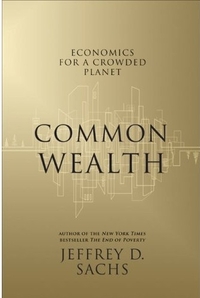

Purchase
Economics for a Crowded Planet
Penguin Press
March 2008
On Sale: March 18, 2008
400 pages
ISBN: 1594201277
EAN: 9781594201271
Hardcover
Add to Wish List
Non-Fiction
From one of the world's greatest economic minds, author
of The New York Times bestseller The End of
Poverty, a clear and vivid map of the road to
sustainable and equitable global prosperity and an augury of
the global economic collapse that lies ahead if we don't
follow it
The global economic system now faces
a sustainability crisis, Jeffrey Sachs argues, that will
overturn many of our basic assumptions about economic life.
The changes will be deeper than a rebalancing of economics
and politics among different parts of the world; the very
idea of competing nation-states scrambling for power,
resources, and markets will, in some crucial respects,
become passŽ. The only question is how bad it will have to
get before we face the unavoidable. We will have to learn on
a global scale some of the hard lessons that successful
societies have gradually and grudgingly learned within
national borders: that there must be common ground between
rich and poor, among competing ethnic groups, and between
society and nature.
The central theme of Jeffrey
Sachs's new book is that we need a new economic
paradigm-global, inclusive, cooperative, environmentally
aware, science based-because we are running up against the
realities of a crowded planet. The alternative is a
worldwide economic collapse of unprecedented severity.
Prosperity will have to be sustained through more
cooperative processes, relying as much on public policy as
on market forces to spread technology, address the needs of
the poor, and to husband threatened resources of water, air,
energy, land, and biodiversity. The "soft issues" of the
environment, public health, and population will become the
hard issues of geopolitics. New forms of global politics
will in important ways replace capital-city-dominated
national diplomacy and intrigue. National governments, even
the United States, will become much weaker actors as
scientific networks and socially responsible investors and
foundations become the more powerful actors.
If we
do the right things, there is room for all on the planet. We
can achieve the four key goals of a global society:
prosperity for all, the end of extreme poverty,
stabilization of the global population, and environmental
sustainability. These are not utopian goals or pipe dreams,
yet they are far from automatic. Indeed, we are not on a
successful trajectory now to achieve these goals. Common
Wealth points the way to the course correction we must
embrace for the sake of our common future.
Comments
No comments posted.
Registered users may leave comments.
Log in or register now!
| 


 © 2003-2025 off-the-edge.net
all rights reserved Privacy Policy
© 2003-2025 off-the-edge.net
all rights reserved Privacy Policy